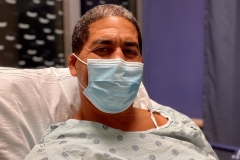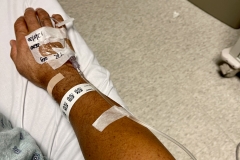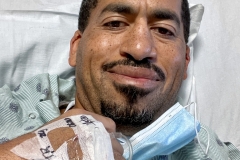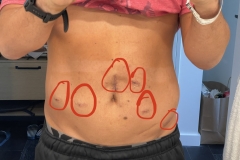As the 1-year anniversary (December 7, 2020) of my cancer-inspired radical prostatectomy approaches, I’ve been thinking about the ways that my life has been impacted. I’ve spent most of this year focused on recovering while adapting to the physical and emotional changes that have occurred. Some of them are obvious and expected. However, many of the other changes were much more subtle and have taken me by surprise. For this post, I’ve attempted to describe them and break them into broad categories although they are obviously interconnected.
-
The physical changes
- Erectile function
- I have experienced no changes in physical sensitivity. This seems obvious, but I assumed that the anticipated erectile dysfunction would be caused by a lack of sensitivity as a result of nerve injury. I was wrong.
- Orgasms feel the same as before but occur in the absence of any any fluid. It is very odd and I’m still getting used to it. There is no pre-ejaculate or ejaculate because the plumbing has been disconnected. I had assumed that orgasms were directly connected to the release of ejaculate, but they aren’t. They are generated in the brain 🤯. Ejaculation is a separate, parallel biological function. How interesting, huh?
- Regaining the ability to obtain and sustain an erection that’s sufficient for sex took several months. The surgeon told me that they consider 12 months of erectile dysfunction normal, so I feel fortunate that I didn’t have to wait that long. The first phase was simply being able to respond to physical stimuli to obtain a partial erection. It wasn’t enough for penetrative sex, but it was a sign that my body was healing properly. About 3 weeks after surgery I was prescribed a low-dose PDE5 inhibitor (Viagra, Levitra, Cialis) to take every night. The dose wasn’t high enough to sustain an erection, instead, it’s meant to facilitate increased blood flow through the penis during sleep. I learned that this is when our bodies do “maintenance” and “repair” work. Having reduced blood flow can hamper the recovery process. So, I made sure to take the pills every night and I believe this was a significant reason I regained function so much faster than expected.
- So far, I’ve lost the ability to be visually aroused. Prior to the surgery, I could look at my wife, fantasize about her and get an erection without ever touching. Now, getting an erection requires physical touch. Maybe this too with change with time. I don’t know, but I’m not concerned about it. I feel an enormous sense of relief and am full of gratitude that I have regained my sexual function.

-
- Urinary incontinence
- Since removing the catheter, I’ve experienced some level of urinary incontinence. Initially, it was a complete lack of bladder control and I had to wear adult diapers 24 hrs a day. Changing them every 3-4 hours, I went through at least 6 a day. I even wore them when went for walks as I restarted triathlon training. They aren’t breathable and are very uncomfortable, but certainly helped to extend my ability to remain outside. I had to limit the length of the walks primarily because the diaper would get too full. It felt like I had a can of coke-a-cola in my pants.
- After a couple of months, I was comfortable wearing them, and this alarmed me. I didn’t want to become dependent, so I stopped using them. I had been doing Kegel exercises to strengthen my pelvic floor muscles and now it was time to put them to the test. I substituted diapers for liners and really began noticing how well (or poorly) I could hold my bladder without leaking. Not long at all! Maybe 60-90 minutes maximum. I realized that leaking it wasn’t simply a matter of not squeezing hard. The muscles themselves were weak. So, even if I did squeeze, when the bladder became full enough, the pressure would force the fluid out no matter how hard I tried to hold it.
- I began taking short trips away from home without a diaper. Without the added security, I experienced tremendous amounts anxiety. I was always looking to see where the nearest bathroom or remote bush could be found. It was hard to relax or fully enjoy myself when I was away from home (or a familiar place). I became hesitant to drive during rush hour for fear of getting caught in a traffic jam without the ability to pull over. Unfortunately, I did lose control of my bladder while driving close to home a few times. With the loss of such a basic bodily function, frustration and despair quickly become normal emotions. Remaining steadfast and determined with recovery is very, very difficult during those times. I experienced some really dark moments early in my recovery.
- After sharing my driving “mishaps” with my wife, she told me to pack an extra set of sweat pants, underwear, and some pee bottles to keep in the back seat. Why didn’t I think of this? The anxiety around driving immediately decreased by 75%. Also, I felt a lot less trapped or tethered to the proximity my home. I still have the clothes and bottles in the car. Actually, I use the bottle quite often. Sometimes multiple times a day if my body is fatigued from long training sessions.
- I also have to be aware of specific bodily movements. For example, when I bend over to hug my wife, I have to focus on holding my pelvic muscles or I will pee down my leg. We laugh about it now, but initially it was very embarrassing. Not surprisingly I cannot do a deep squat without peeing. When sitting in a chair, if I reach to the left and pick something off the floor, I will pee on myself. At this point, I tend to just laugh at myself and then go wash up.
- I have not slept through the night since the surgery. Initially, I was so afraid of peeing in the bed, I woke up to use the bathroom five to six times a night. Even when I wore a diaper, I was concerned that it would leak, so I still woke up. Now, I have better control but will wake up at least twice to use the bathroom. If I don’t, my bladder will get full enough that when I roll over or rotate my legs, I have a very high risk of peeing in the bed.
- Ironman training requires me to always be well hydrated. As a consequence, my bladder fills constantly so I now have tension between worrying about access to a bathroom and not being properly hydrated. Neither situation is ideal. Most of the time I chose to remain hydrated.

-
Mental changes
- I constantly grapple with anxiety about going out with groups of people. When training, I’ve mostly avoided long bike rides with a group. When I do them it is with those I’m very familiar with. In this same vein, I run alone or with only one other person who knows my situation.
- I’ve also avoided riding in a car with other people. I don’t want to have an emergency in someone else’s vehicle. Now, getting on an airplane can be stressful because I have to be strategic about when to use the bathroom before boarding and landing. There are still times where I’ve been so nervous that I decided to changed into a diaper moments before boarding. There are times that the cumulative effect of these individual situations leaves me mentally exhausted at the end of the day.
-
Logistical changes
- I resumed racing triathlons again in June. During my first endurance race (Ironman Lubbock) I was very quickly reminded of how well my mental and overall physical recovery had progressed while being humbled by the limits of my bladder control.
- Just a few weeks ago experienced more serious consequences of the incomplete recovery during Ironman Florida.
-
Emotional effects
- Although I have no desire to make any more children, knowing that I am infertile gets under my skin. Not having the option of a basic biological function is tough to accept at times. I don’t worry or dwell in the feeling, it just leaves me with a sense of being incomplete.
- Worrying about being able to sustain an erection during sex is both distracting and mentally taxing. It can actually become a self-fulfilling thing. I’ll worry, then become very concerned about being able to sustain the erection which often results in the loss of it. I’ll feel embarrassed or inadequate which feeds a negative mental cycle. I’ve learned that communicating openly and slowing everything down helps me to confidently get back into the moment.
- Without a doubt, I’ve survived cancer and am doing very well. At the same time, I feel uncomfortable saying (or thinking) that I’m a cancer survivor. I’ve seen how cancer can ravage and debilitate the human body in much more serious ways than I’ve endured. Occasionally, I don’t perceive my journey as difficult enough to warrant the label of “cancer survivor”.

-
Opened heart
- Navigating such a traumatic circumstance has opened my heart to empathy, compassion, and patience. In particular, compassion and patience with myself. Also, learning to be aware and more present in as many of life’s moments as possible has changed how I frame everything. I tend to find reasons to be grateful and feel love most of the time. As a result, I am usually filled with joy and excitement for what life has to offer.
- I don’t spend time wondering what might have been or even ask “why me”. I’ve learned to just accept “what is” which provides a level of mental and emotional stillness. There is tremendous freedom in letting go and allowing life to be.
- By being open and sharing my experiences, I’ve found a whole new community of wonderful people with whom I share a common goal – recovery, healing and growth. Talking with and sharing parts of life with them has helped me recognize more of the beauty that surrounds each of us.

Like this:
Like Loading...






















Thank you so much for this candid, complete post. I’ve followed you on IG for a while and knew you were a survivor. And a super flexible badass! Found your blog today and really appreciate you sharing your journey. I get my catheter out tomorrow, 10 days after prostate removal. Knowing what to expect makes some of the unpleasantness a little easier to take. Thanks again, brother.
Hey Denny K, I’m glad you found the blog and can take something useful from my experience. I hope that you are well post-surgery and that your recovery progresses incident-free. Feel free to reach out to me here or on IG anytime. I am always happy to share and learn. – Chris